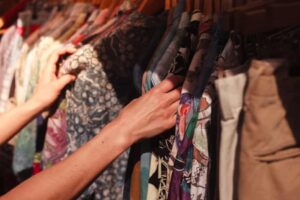
It’s a Saturday morning and I’m pulling clothes out of my suitcase and hanging them on a rack. Around me are three others attending their own displays. We’re all here for the same purpose – to find a more sustainable way to part with the clothes we no longer need.
Selling my secondhand clothes at rent-a-rack stores is just one approach I took over the past year in my quest to find alternatives to my local overflowing op shop.
Most of us have seen the images of towering piles of clothes dumped overseas in places like Kantamanto, a market in Ghana’s capital, Accra. It definitely made me think twice about where my discarded items go, and encouragingly, there are now more ways to make room in your wardrobe.
Having worked in the textile and education field for more than 30 years, Sandy Donlan, owner of Adelaide-based rent-a-rack boutique ReFab Circular Fashion, founded her business to reduce the amount of quality clothing going into landfill.
“I wanted to provide an option where clothes could be preloved, rather than following a linear fashion model where the clothes are made, purchased, and often discarded,” she says.
While money can be made selling secondhand clothes, in Donlan’s experience, many of her sellers are happy to just rid themselves of their unwanted items.
“I found that people feel guilty about the fact that they’ve got clothes in their wardrobe. But we’re always evolving. So being able to let the clothes go is important for people.”
Get someone else to do it
Consignment stores and secondhand sellers offer a hands-off approach to decluttering. They select the pieces they think will sell and once sold, take a cut and give you the rest in cash or store credit.
Be prepared for them to judge your clothes – it’s not personal, but they know what will hit the mark.
One store with a slightly different model is Swop, which will purchase items directly from you. “We follow strict criteria around the brands, items and styles we buy to ensure that we can confidently resell those items,” says Swop’s Emma Regolini.
